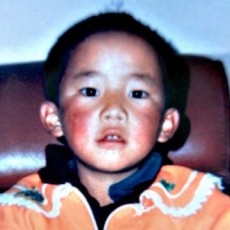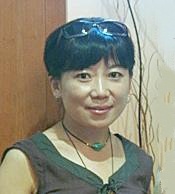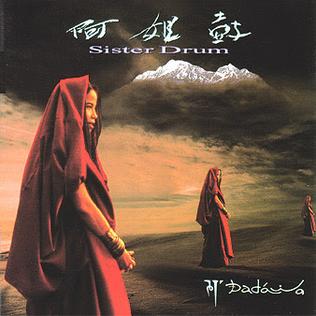
The music of Tibet reflects the cultural heritage of the trans-Himalayan region centered in Tibet, but also known wherever ethnic Tibetan groups are found in Nepal, Bhutan, India and further abroad. The religious music of Tibet reflects the profound influence of Tibetan Buddhism on the culture.

Gedhun Choekyi Nyima is the 11th Panchen Lama belonging to the Gelugpa school of Tibetan Buddhism, as recognized and announced by the 14th Dalai Lama on 14 May 1995. Three days later on 17 May, the six-year-old Panchen Lama was kidnapped and forcibly disappeared by the Chinese government, after the State Council of the People's Republic of China failed in its efforts to install a substitute. A Chinese substitute is seen as a political tool to undermine the reincarnation of the Dalai Lama, which traditionally is recognized by the Panchen Lama. Gedhun Choekyi Nyima remains forcibly detained by the Chinese government, along with his family, in an undisclosed location since 1995. His khenpo, Chadrel Rinpoche, and another Gelugpa monk, Jampa Chungla, were also arrested. The United Nations, with the support of numerous states, organizations, and private individuals continue to call for the 11th Panchen Lama's release.

Tsering Woeser is a Tibetan writer, activist, blogger, poet and essayist.

Shangri-La is an album by Taiwanese-American R&B artist, Leehom Wang. It was released on 31 December 2004 by Sony Music Taiwan. In this album, Wang incorporated the often unheard music of the Chinese ethnic minorities and therefore began the first chapter of "chinked-out", a term he coined together to represent the ties between Chinese and Western music. He experimented with the tribal sounds of Taiwan, Tibet, and Mongolia, traveling the area carrying 15 kg of equipment while fighting bouts of altitude and food sickness.

Han Hong, is a Chinese singer, songwriter and philanthropist of mixed Tibetan and Han ethnicity. Like her mother, a Tibetan singer, Han Hong is able to shift quite easily from piercing high pitches to soft low tones. Han Hong is one of the most popular Chinese female musicians who specializes in a variety of Chinese folk music. Most of Han's work reflects the Tibetan culture, but Han also uses elements of Jazz, R-n-B, Rock-n-Roll and Latin music in her music work.

Sister Drum (阿姐鼓) is the second studio album by Chinese singer Dadawa. The album is heavily influenced by the music of Tibet and is notable for being the first Asian CD to ship over one million copies in China.

Lhalu Tsewang Dorje commonly known as Lhalu, Lhalu Se, or Lhalu Shape, was a Tibetan aristocrat and politician who held a variety of positions in various Tibetan governments before and after 1951.

Alan Dawa Dolma, known mononymously as alan, is a Tibetan singer from China. She is a graduate of the People's Liberation Army (PLA) Academy of Art in Beijing, majoring in vocal music and erhu, which she has played since childhood. Alan is known for a distinctive technique called the "Tibetan wail".

The Kashag was the governing council of Tibet during the rule of the Qing dynasty and post-Qing period until the 1950s. It was created in 1721, and set by Qianlong Emperor in 1751 for the Ganden Phodrang in the 13-Article Ordinance for the More Effective Governing of Tibet. In that year the Tibetan government was reorganized after the riots in Lhasa of the previous year. The civil administration was represented by the Council (Kashag) after the post of Desi was abolished by the Qing imperial court. The Qing imperial court wanted the 7th Dalai Lama to hold both religious and administrative rule, while strengthening the position of the High Commissioners.
Karma Tseten, also known as Zhingshak Tseten Dorje was a king of Upper Tsang in West Central Tibet. He was the founder of the Tsangpa Dynasty, that had an important role in the history of Tibet from 1565 to 1642. Karma ruled during the period 1565–1599.
Ngapoi Cedain Zhoigar was a member of the Tibetan aristocratic Ngapoi clan. Since the founding of the PRC, she served as the Vice President of the Tibetan Women's Federation. She was married to Ngapoi Ngawang Jigme. The couple has 12 children.

Pema Tseden, also called Wanma Caidan was a Chinese Tibetan film director and screenwriter. He was a professor at the China Academy of Art in Hangzhou and a member of the Film Directors Guild of China, China Film Association, and Chinese Film Literature Association. He is known for making many films entirely in Tibetan language and presenting a more realistic depiction of Tibetan life as opposed to the exoticism often associated with the region.
Jamyang Dolma is a Chinese singer of Tibetan ethnicity.

Dorje Tseten, also Duojie Caidan (多傑才旦); November 1926, Huangzhong - July 6, 2013, Beijing) is a scholar, historian and Chinese politician of Tibetan ethnicity. He was chairman of the Tibet Autonomous Region (TAR) before becoming the first director of the China Tibetology Research Center.
Drag-yab is a Sino-Tibetan language recently documented by Suzuki & Nyima. It is spoken in the southern half of Zhag'yab County, Chamdo, eastern Tibet.
Norbu Dondrup is an ethnic Tibetan politician of China. He is the Executive Vice Chairman of Tibet Autonomous Region and a member of the Standing Committee of the Tibet Autonomous Region Committee of the Chinese Communist Party (CCP).
Doje Cering is a Chinese politician of Tibetan ethnicity who served as chairperson of the National People's Congress Ethnic Affairs Committee from 2003 to 2008, minister of Civil Affairs from 1993 to 2003, and chairman of Tibet Autonomous Region from 1985 to 1990.
Garma Cedain, also spelled Gama Zeden, is a Chinese politician of Tibetan ethnicity who is a current vice chairman of the Tibet Autonomous Regional Committee of the Chinese People's Political Consultative Conference, in office since January 2022.
Kyabchen Dedrol,, is a Tibetan contemporary writer. Born in Chukhama, Chokho (ཁྲོ་ཁོ་ཆུ་ཁ་མ།), a nomadic community in Amdo in the 1970s, Dedrol is the co-founder and editor in chief of Butter Lamp (མཆོད་མེ་བོད་ཀྱི་རྩོམ་རིག་དྲ་བ།) the first online Tibetan-language literary journal. Dedrol reads world literature extensively through English and Chinese, and has translated numerous short stories, poetry, and technology reviews from English and Chinese into Tibetan language.










